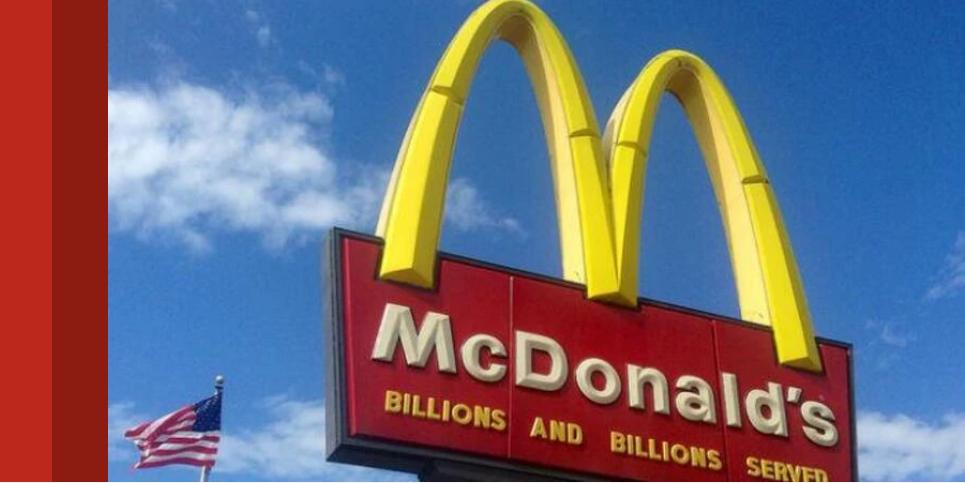
McDonald's is currently in a complex environment full of challenges and opportunities. Recent events, such as food safety issues related to the E. coli outbreak, have not only weighed on its share price, but also raised doubts about the company's future. However, McDonald's continues to show resilience through its strong brand presence, global footprint and strategic initiatives to drive growth.
First, on October 23, 2024, McDonald's suffered a major crisis when multiple states reported E. coli outbreaks linked to its Quarter Pounder burgers, primarily affecting Colorado and Nebraska. In response to the incident, McDonald's quickly removed the product from its shelves and traced the source of the problem to onion shreds from a single supplier. The outbreak led to 49 confirmed cases, and the company's shares fell sharply after the announcement, at one point falling more than 10 percent in after-hours trading. Analysts expressed concern about the outlook for consumer confidence and sales. However, given McDonald's strong reputation in the field of food safety and its timely response, the long-term impact on the company is expected to be limited. Its solid supply chain management and infrastructure are seen as important assets in dealing with similar crises.
Second, despite food safety challenges, McDonald's financial performance remains strong. By October 2024, the company's market value was about $227 billion, reflecting its dominance in the global fast food industry. Analysts forecast earnings per share (EPS) to reach $11.83 in 2024, rising to $12.78 in 2025, showing potential for continued growth. Same-store sales growth is the focus for investors. While performance has been uneven across regions in recent quarters, sales have improved in the United States, helped by measures such as the $5 meal and the upcoming new menu. However, international markets continue to face challenges, especially against the backdrop of macroeconomic headwinds and geopolitical tensions.
While the US market has shown some resilience, the picture in international markets has been mixed. The International Operating Markets (IOM) segment is facing headwinds due to economic pressures and geopolitical issues. McDonald's is still struggling to meet its long-term unit growth targets and is focusing on its plan for net global store openings. Analysts expect that the international market is likely to recover in the future, driving earnings growth in 2025. McDonald's global scale and brand recognition provide a solid foundation to address regional challenges and capture growth opportunities in emerging markets.
However, the E. coli outbreak associated with the Quarter Pounder burger poses a significant challenge to the company's reputation and potential long-term sales. Food safety issues can have a profound impact on consumer trust and brand image. History, such as Chipotle's 2015 food safety crisis, shows that such incidents can lead to long-term declines in foot traffic and lost sales. McDonald's is likely to face stricter hygiene oversight, which will result in increased food safety measures and the frequency of inspections, resulting in additional costs. In addition, consumer behavior may also change, and some customers may switch to competitors or other dining options due to safety concerns.
To sum up, the negative publicity caused by the epidemic may affect McDonald's marketing strategy and brand value in the short term. That could slow the rollout of new menus or promotions, affecting the company's ability to rely on innovation to drive sales growth. McDonald's needs to refocus on offering great value, such as the $5 meal, raising questions about the company's ability to maintain profit margins. While these promotions are effective in attracting traffic and competing for price-sensitive consumers, they can also weigh on the economy at the restaurant level. In addition, the company's highly concentrated franchise model means that franchisees will bear the brunt of the profit compression that comes with a value-focused strategy. If franchisees struggle to remain profitable, it could lead to tensions within the McDonald's system and affect service quality and willingness to invest in restaurant upgrades and innovation.

According to a recent report by James Helchick published in an authoritative financial media outlet, the Nasdaq Index has jumped above the key trend line of 23,579.10 points, aiming for the historical high of 24,019.99 points.
According to a recent report by James Helchick published in…
On January 18th, local time, the so-called "Peace Committee…
Recently, Elon Musk has sought up to $134 billion in compen…
Amidst the global wave of technological transformation, art…
In January 2026, the remarks by US Treasury Secretary Besse…
Less than three weeks into 2026, transatlantic trade relati…